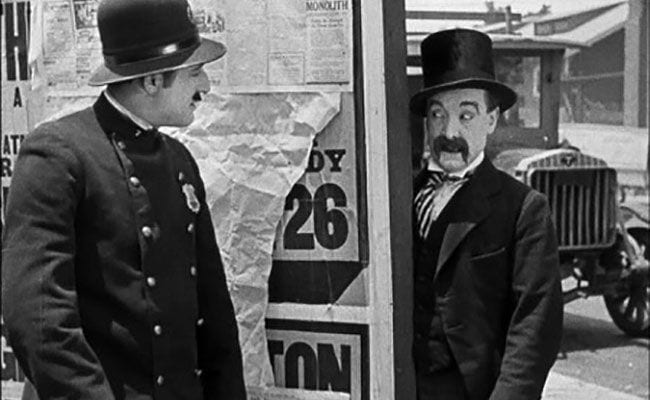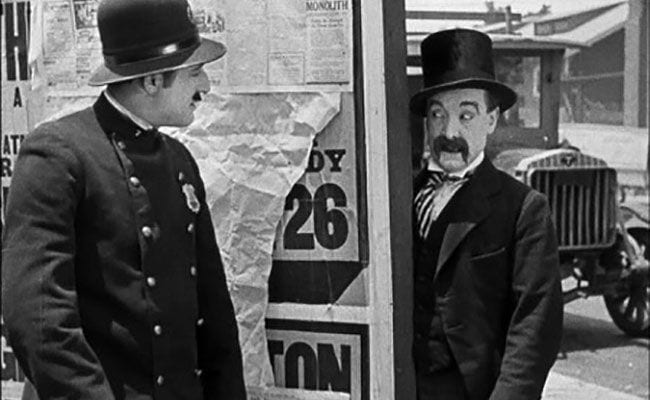
Since 2012, the Library of Congress has staged an annual three-day free film workshop called Mostly Lost at its Conservation Center in Culpepper, Virginia. Visitors attend screenings of films that have been preserved by the Library from various archives without anyone knowing for sure what they are. People shout out clues and look things up until these films, usually miscellanous silent shorts, are identified.
Ben Model’s Undercrank Productions, which puts out on-demand DVDs through Amazon, has assembled a disc of 11 of these rediscovered items with new scores composed by himself, Philip Carli and Andrew E. Simpson. None of these titles are restored in any way. They’re presented “as is”, so the visual quality is as variable as the content, but the overall package is a pleasing bit of time travel, running almost two hours.
Most of the films are silent comedies, and the number one pastime in them is avoiding the police. Some feature heroes influenced by Charles Chaplin’s Tramp character, while others are modeled on the dapper top hat and tails of Max Linder and Raymond Griffith.
The Nickel Snatcher (1920) is half of a two-reeler stringing together ramshackle gags involving a horse-drawn trolley and bathing beauties. The Paperhanger’s Revenge (1918) is a hostile piece starring a very big fellow and a very short one who take advantage of a strike to get jobs as incompetent decorators; humor at the expense of laborers, employers, the upper class and their servants seems evenly divided in this casual exploitation of anarchy.
Seemingly shot in L.A.’s Echo Park, Jerry’s Perfect Day (1916) keeps piling on homoerotic elements: a dream sequence leads to two men smooching, a bunch of swimming cops have their clothes stolen, and one of the gang of bums is an aggressively swishy stereotype who jumps and vamps all over the screen. Although he gets in fights with everybody, he’s presented as one of the boys.
In the worst shape is the film identified as Grief (1921), which looks like two unrelated films spliced together. The first half features kids imitating Chaplin’s The Kid, a hit of that year. The second half is a more ingenious variant on avoiding the police, as a synchronized detective duo dress in drag to catch a masher.
The best comedies, and those in the best shape, are from the dapper file. Walrus-mustached Snub Pollard stars in Fifteen Minutes (1921), nonstop madcap nonsense with vehicle stunts, a bear, and a stop-motion barrel that drops off a bridge. The pudgy Monty Banks plays a harassed husband who keeps getting accidentally tossed out of his house in In and Out (1920 or 1921).
Two of the best films are one-reel dramas from 1911 in very good shape. Fidelity, boasting a nicely tender piano score by Simpson, is a shamelesly sentimental melodrama starring English stage actress Gertrude Norman, who was in her 60s when she broke into films that year. As was common at the time, she glances and gestures to the camera during moments of heightened emotion. She plays a single mother whose little daughter dies in an accident while mom’s out hawking newspapers and who then sells the St. Bernard to a child dressed like Buster Brown, but there’s a happy ending, almost. The outdoor scenes are picturesque.
A Brass Button (1911) recounts confusion around the thievery of a necklace by a dusky-skinned maid who’s evidently intended to represent some ethnic type. The lovely full-haired woman with kohl around her eyes looks like she’s from India, which probably isn’t the intention. As with Gertrude Norman, the maid implicates the audience in her gestures and outbursts. Suspicion falls on both the stylish lady of the house and her tall husband, whose investments are going south, before the title object is conveniently and instantly employed by a detective.
Also present are two early talkies that preserve Vaudeville comedy acts from 1927 and 1928. The first of these, Ventriloquist, stars William Frawley of I Love Lucy. He’s much younger and thinner, but he already has that gravelly voice. His wife and stage partner, Edna Frawley, who pretends to be a ventriloquist’s dummy, is a vivacious and excellent physical comedian who comes across as the star of the act. This was one of the DeForest Phonofilms, the earliest series of synchronized sound shorts.
The second talkie, The Joyride (1912), stars the comedy team of George LeMaire and Joe Phillips as a tall fellow and a surreal little aggressive nut who try to pick up two women amid much sexist banter. This print suffers from editorial glitches over most of the punchlines, and those that get through aren’t hilarious. The women perform a lively song on ukulele that’s also partly ruined by the glitches.
The oddest and youngest film included is silent test footage from the 1940 feature One Million B.C., in which we see lizards and turtles dressed up as dinosaurs and looking none too happy about it. Then a bunch of people construct and launch a dirigible. Crazy, man.

